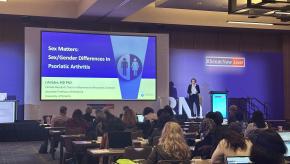Articles By Kathryn H. Dao, M.D.

The War Rheum
The effects on rheumatologists and their patients living in Ukraine largely have been unseen by the world. At ACR Convergence 2024, I met Dr. Marta Dzhus who practices at St. Michael's Clinical Hospital in Kyiv; she shared her story with me about the humanitarian crisis in rheumatologic care in Ukraine because of the ongoing war. Here is an excerpt of our conversation.
Read Article
Rheum to Travel
One of the benefits of attending conferences aside from scientific exchange is meeting new people. At one symposium, I met a unique rheumatologist. This chance meeting turned into an interview, that turned into a blog. Holly Bastian, MD is a rheumatologist practicing without the restraints of being tied to a place. She is a nomadic rheumatologist, a rheum on the road who embodies Johnny Appleseed as she spreads her knowledge and skills to multiple places in need of rheumatologic services. This is her story.
Read Article
Best of 2024: Eating for Rheumatoid Arthritis
The majority of practicing rheumatologists at RheumNow Live 2024 were unaware of the new ACR guidelines issued in 2022 regarding dietary and lifestyle recommendations for patients with Rheumatoid Arthritis. Dr. Monica Guma reviewed these guidelines during her lecture on the impact of diet on disease activity and therapeutic response.
Read Article
Gangsin: 갱신 Korean: refresh, renew, updated
Remaining status quo requires less effort than making a change. Over the last 20+ years, I have listened to thousands of patients confide their personal stories. Some remained paralyzed in their current state of distress, fearing new situations may be worse. I was one of them, until recently. In this final blog of my trilogy on self-discovery, I reveal my new life.
Read Article
Chào: (Vietnamese: Goodbye/Hello)
One of the first words I was taught by my parents was “chào”. In Vietnamese, you say chào and bow when you greet someone or when you leave as a sign of respect. In my first blog about self-discovery, I detailed the burnout and why I left clinical practice. In this second blog of the trilogy, I wanted to share encounters with patients as I told them goodbye. While I received great advice when I started practice, no one ever talks about how hard it is to leave.
Read Article
ICYMI: Sex Disparities in PsA/SpA
Dr. Eder delivered an illuminating talk at RheumNow Live 2024 on sex differences in psoriatic arthritis; the disease may manifest differently in men and women, and therapeutic responses may differ between the sexes.
Read Article
Karoshi - {Japanese 過労死: Death by Being Overworked}
Over the last few decades, Japanese workers were collapsing dead at their desks or committing suicide due to the high stress stemming from their jobs; Japan coined this phenomenon, “Karoshi.” In 2021, the World Health Organization and International Labour Organization issued a warning: working 55+ hours a week is a serious health hazard and increases the risk for death from heart disease and stroke. But since the pandemic, I see many colleagues working hard at the expense of their health, family life, mental and emotional well-being. I never thought I would be burned out because I had passion for my job.
Read Article
ICYMI: Eating for Rheumatoid Arthritis
The majority of practicing rheumatologists at RheumNow Live were unaware of the new ACR guidelines issued in 2022 regarding dietary and lifestyle recommendations for patients with Rheumatoid Arthritis. Dr. Monica Guma reviewed these guidelines during her lecture on the impact of diet on disease activity and therapeutic response.
Read Article
Eating for Rheumatoid Arthritis
The majority of practicing rheumatologists at RheumNow Live were unaware of the new ACR guidelines issued in 2022 regarding dietary and lifestyle recommendations for patients with Rheumatoid Arthritis. Dr. Monica Guma reviewed these guidelines during her lecture on the impact of diet on disease activity and therapeutic response.
Read Article
Sex Disparities in PsA/SpA
Dr. Eder delivered an illuminating talk at RheumNow Live 2024 on sex differences in psoriatic arthritis; the disease may manifest differently in men and women, and therapeutic responses may differ between the sexes.
Read Article



